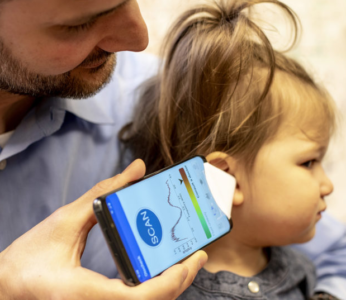Jawless sea lampreys, more sunscreen questions, ear infection app, and more
17 May 2019
Posted by Andrew Kantor
Georgia hospitals getting safer
The latest Leapfrog report on hospital safety found that no Georgia hospitals received an ‘F’ this time, and more are getting higher ratings — including 27 out of 76 in the state that got an ‘A’. This moves the state up from 17th place to 15th among the 50 states and Washington, D.C.
Nature red in tooth and, um, gum?
Having a drug cross the blood-brain barrier is tough, because so many meds have molecules that are too large to make it. But some brain conditions put “holes” in that barrier … and now researchers from the University of Wisconsin-Madison have found a way to use molecules from the creepy, jawless* parasitic sea lamprey to take advantage of that and deliver anti-cancer drugs directly to brain tumors.
“Molecules like this normally couldn’t ferry cargo into the brain, but anywhere there’s a blood-brain barrier disruption, they can deliver drugs right to the site of pathology.”

* You don’t want to click here to see how.
Sunscreen questions continue
The other day we told you that the FDA was going to be looking at how safe sunscreens are, now that we know the ingredients actually enter the bloodstream.
The FDA proposed some new guidelines for the products, but now it seems that 60 percent of products on the market wouldn’t meet those new ‘safe and effective’ guidelines, according to a review by the Environmental Working Group.
As the group has reported in the past, over 60% of the products evaluated do not offer adequate sun protection or contain potentially harmful chemicals. What makes this year’s report different, said Director of Healthy Living Science Nneka Leiba, is that the 2019 products were judged using FDA safety guidelines proposed in February.
“The fact that 60% of the market seemingly wouldn’t be considered safe and effective by the FDA is a huge deal.”
Pick up the pace
You may not be able to cheat Death, but if you walk fast you might get yourself a few steps ahead of him. (That’s the headline, but what the study actually says is that ‘amount of exercise’ is a better indicator of mortality risk than body-mass index.)
Low salt, light head
People who reduce their sodium intake (e.g., to try to reduce hypertension) might tend to get lightheaded more often thanks to orthostatic hypotension, i.e., a drop of blood pressure when standing.
An app to diagnose ear infections
Nifty trick — researchers at the University of Washington, Seattle have created a smartphone app that can diagnose ear infections more accurately than a physician with an otoscope — 85 percent for the app vs. 51 percent for the otoscope
All the app needs is a small paper funnel, which can be fashioned at home from a piece of paper and with directions in the app. The funnel is placed on the outside of the ear, at which point the app sends a bird chirp-like sound into the ear. Depending on the sounds that the app picks up in return, a machine learning algorithm built into the app is able to tell whether or not there is liquid in the ear.

More kids, more diabetes
The more children a woman has, the greater the chance she will develop diabetes after menopause — at least according to a new study out of the Zhejiang University School of Medicine in Hangzhou, China.
The “hidden health crisis” we bet you didn’t know about
Snakebites. Really.


